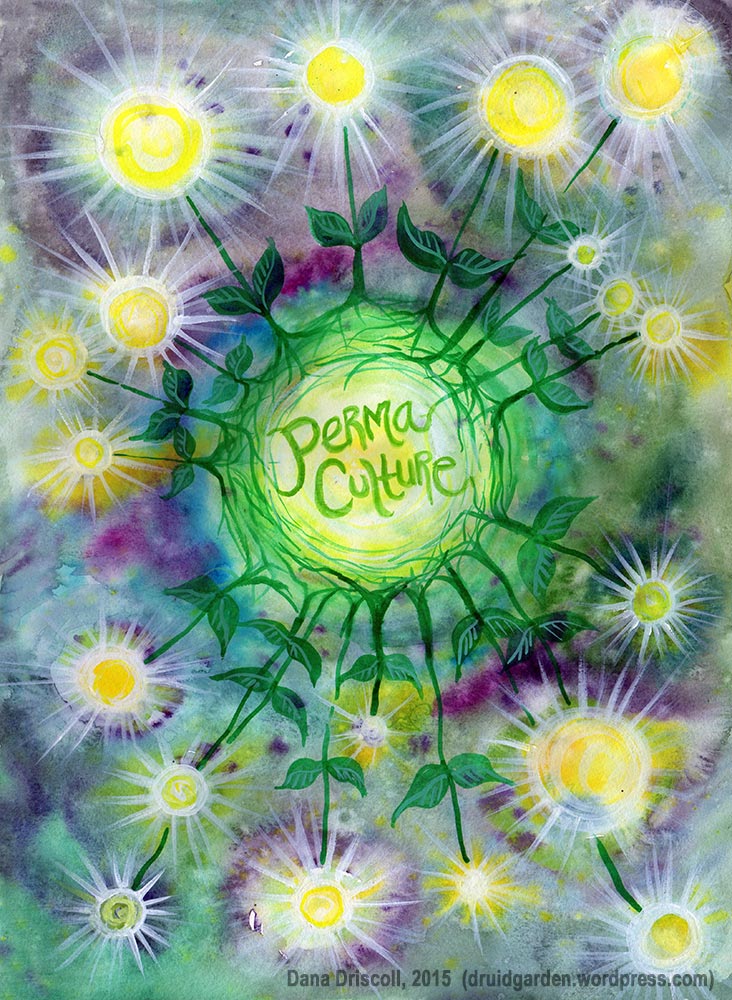Dana Driscoll
– Artist’s Website –
As my own confessional here has demonstrated, the Free Range Fantasy can be as destructive as the white picket fence because it limits your vision to this one ideal. It stifles you, preventing you from doing something now that helps move towards sustainability, rather than dreaming of some far off thing that may never be your reality due to factors, probably many beyond your immediate control. More, if every person wanted their 50 acres, we wouldn’t have enough lands available! Part of the work of living in a sacred, sustainable manner is about living better in the circumstances that make up our present reality, not dreaming of a lifestyle that may not be tenable for that reality. It is a good goal to work toward if your life circumstances allow, certainly, but there are other ways and means of living.
All of this has really been brought to life, and has shifted for me, during my permaculture design certificate and really embracing the alternative perspective that permaculture provided. Visiting small front-yard farms and alternative spaces was highly inspiring! Embracing small, slow and sustaining solutions is the new motto that I strive for. Permaculture isn’t about a one-fits-all model of sustainable living, but rather about applying ethics and design principles that can work for any life situation. It is here, that the power of these principles, that I found my path forward for regenerative, sacred living. And there are lots of books and resources that share alternative paths for such living, for example, how to make a permaculture patio! Permaculture isn’t the only way into what I’m talking about here, but it is certainly a way that has helped me get beyond the Free Range Fantasy in positive and productive ways.
I’m now at the point where I’m starting to consider buying a new piece of property after my life transition to a new job in a new state. The urban homestead appeals to me at this point my life, the idea of creating a site where people can walk to, that is easily accessible, that is very visible, and that can host permauclture meetups, herb classes, plant walks, and more. This site could provide sustainability and permauclture education right in the middle of my own community and town. That’s probably going to be the route I go for one simple fact–while I am blessed to physically be able to do this work, my call is to educating others. To me, this education must occur where people, here and now, where people are rooted and where they live their everyday lives. And those people aren’t just those who are privileged with being able bodied, have abundant finances, have perfect partner with which to do the work, or have their 50 acres debt free and ready to go. Rather, they are poor people, middle class people, disabled people, students, single parents, people of different walks of life–and I think its important to meet them where they are, in the places they inhabit, and show them options of sustainable living that they can do right here and right now. I now understand that that the kind of off grid living promoted by the Free Range Fantasy takes a community. If I have no family, partner, or community to bring to a homestead, than it seems that I will bring the homestead to the community and create family right here where I am.
But another piece of this is that there are always trade-offs and decisions to make, and each kind of living has its benefits: fossil fuel use and finances being two of them. In my case, I can substantially reduce my fossil fuel dependence if I live in a place where I can walk or bike to work and eliminate most of my car use–and seeing the destruction that fossil fuels have brought firsthand on the land here in PA make me even more eager to go that route. In MI, I used to commute 18 miles to work one way, and although the rest of my living was quite sustainable, nothing I did could really address 36 miles round trip 4 or so times a week. Further, acreage is expensive, and I can also stay out of debt if I live in town modestly; that’s another critical factor.
In sum, it’s important to realize that the Free Range Fantasy is an option for certain people who have the means, drive, family, and opportunity to do so. However, it is certainly not the only vision possible, nor reasonable, given the challenges we face. For many of us, it is only a fantasy, and keeping our heads in a fantasy doesn’t address the importance of living in the here and now. We need a patchwork of unique responses, as many responses and sustainable living practices as we have people. We need people to do everything they can, using the best aspects of their own contexts to make it happen: abandoned lots in Detroit becoming gardens; apartment dwellers learning vermicomposting; a local school planting a garden; urban beekeeping; whatever it is. We are starting to see those visions emerge, and we need voices doing all of these things. And so, dear readers, I hope you will be inspired by the multitude of ways, the patchwork of options, before us for sustainable living and regenerative, healing lives!






